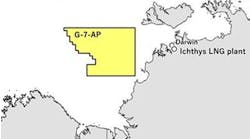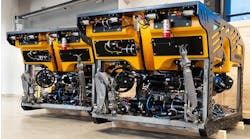Gastech 2024: AI reducing costs, enhancing operational efficiency for offshore oil and gas production
By Dr. Chris Cooper, AIQ
As demand for energy trends ever higher, offshore production of hydrocarbon resources is on the rise in attempts to maintain pace. Offshore operations have typically been higher cost endeavors, given the associated challenges of explorations, logistics and safety. However, in the era of accelerated digitization of oil and gas operations in general, and offshore activities in particular, positive developments are occurring to reduce the cost of offshore production significantly, while also lowering negative impacts on the environment.
Artificial intelligence (AI) is a technology change driver that supports the reduction in the per barrel cost of the production of hydrocarbons. Progressive energy companies around the world are investing in AI-based innovations to optimize operations, reduce opex, drive down capex, catalyze sustainability efforts and accelerate energy transition agendas.
Specific challenges associated with offshore oil and gas industry activities often relate to how to minimize well and facility instability, reduce transportation costs and manage disruption to operations, all of which may result in costly downtime and reduced production output. The absence of continuous operational optimization in response to dynamically changing field conditions can potentially increase costs, while a lack of real-time data availability from monitoring may also hinder consistent production.
AI solutions are helping usher in an entirely new world of remote and autonomous capabilities that are having a marked impact on streamlining the cost and sustainability profiles of offshore operations. Cloud-based AI algorithms to autonomously operate wells, which self-adjust according to hanging conditions, for example, enhance safe well operation. This leads to the improvement of efficiency, reducing the need for travel and physical interventions, and supports the minimization of emissions.
ADNOC leverages AI to optimize its operations
The positive impact of AI is not a fictional or predicted development. It is occurring in the energy sector today and is accelerating in its use cases as the models ingest more operational data and learn and predict activities more quickly and accurately.
In the United Arab Emirates, for example, Abu Dhabi National Oil Company (ADNOC), which says it is on a mission to become the most AI-enabled energy company in the world, reported that AI solutions across its full value chain generated US$500 million in value during 2023.
This achievement is part of a multi-year program to accelerate the deployment of AI solutions across ADNOC’s businesses, from field operations to smarter and quicker corporate decision-making, which has also resulted in the abatement of up to 1 million tons of CO2 emissions between 2022 and 2023, the equivalent of removing about 200,000 gasoline-powered cars from the road.
A co-dependent relationship between AI and the energy sector
While AI is already driving operational gains to offshore operations and more, the context in which these solutions are developed and delivered also needs to be placed in proper perspective. AI in and of itself consumes a tremendous amount of electricity, not to mention the water resources needed to help cool data centers and other related infrastructure. The global energy landscape thus faces a critical challenge: balancing this ever-growing demand for power with environmental sustainability and energy transition.
AI is likely to emerge as the single most impactful technology in the history of the energy sector, with offshore operations set to benefit exponentially. Against this backdrop, its tremendous appetite for energy must be seen in the light of the significant contribution AI makes to improving efficiencies, safety and emissions reduction. A symbiotic, co-dependent relationship is forming between AI and the wider energy sector; if managed correctly, it will facilitate the further growth and development of both sectors for decades to come.






